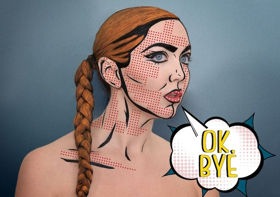Guest Blog: Vicki Baron On OK, BYE at VAULT Festival

Devising is a wonderful way to make theatre. Everyone in the rehearsal room contributes ideas, and the performance that you make is so much richer for being a combination of the whole team's imagination.
Your weapons of choice can be anything at all: music, imagery, movement, text and improvisation, to name but a few. Devising is also unglamorous and - self-indulgent as this may sound - an excellent way to process your feelings.
When Kate Goodfellow and I first started talking about Ok, Bye two years ago, neither of us were in a particularly good place. I wish that I could say our show was an idea born of idle curiosity, but in reality we've both been through a lot of heartbreaks and bereavements and we needed to find a way to deal with those losses.
Now, I'm delighted to say, the devising process has taken us very far away from our original upsets. This show is filled to the brim with surprising joy and heart-warming stories.
The process of making Ok, Bye began with a conversation about what we had been forced to say "goodbye" to and how everything, when you think about it, comes down to a final farewell.
Once we knew what our topic was, we began approaching people in our lives for their input. Our friends, families, colleagues and acquaintances told us their stories and we recorded them. We heard all sorts of tales about pets, religion, parents, weight loss and more.
The wide variety of narratives allowed us to broaden the scope of the show from unfortunate loss to elected partings and, frankly, some very weird stuff. Pigeons may or may not have been involved.
Interviewing someone you care about for the sake of a devised show is an intense and potentially risky venture. We have to be transparent and sensitive, making sure that our participants know we want to tell their stories because they're interesting and relevant to our audiences.
We also make sure that we never prescribe our responses; sometimes we go into interviews thinking that we know exactly where the conversation will go, but it's always much more rewarding to be surprised by the unprompted responses of our participants. People's words are powerful when you give them room to say what they mean.
Once we have the audio file of an interview, we take it to a rehearsal and play it to the actors. We pause it to ask questions about the context of the interview; we write down words or phrases that give us clear mental images, and we discuss how we might begin to bring the conversation to life on stage.
We gradually edit and refine the contents of the interview as a team so that the personality of the participant shines through as clearly as possible, making sure that we are retelling the story as clearly and faithfully as we can. We never know exactly where a scene is going to end because we're not precious about anything, and that's extremely liberating as a creative approach.
Sometimes audience members approach us after our shows and talk to us about our intentions. Previous comments and questions include "I wasn't sure whether I was allowed to laugh at that scene" and "I'm not sure whether we were supposed to be worried about that person, but I was".
My favourite by a long way was "Did you mean to do that?" I can't remember what the question was about exactly, but it delighted me. To be perfectly honest, we never really mean to do anything: that's why our shows work. We don't have an agenda to push or a point to prove. We just want to have a conversation with you.
At its heart, devising is about taking risks within a safe and inspiring environment. Not knowing exactly how a piece will pan out is never a problem when you have an enthusiastic group of creative people working together towards a common goal. It's exciting to explore and discover stories with my actors, because we trust one another to tell a story well.
OK, Bye at VAULT Festival 7-11 March
Comments
Videos

